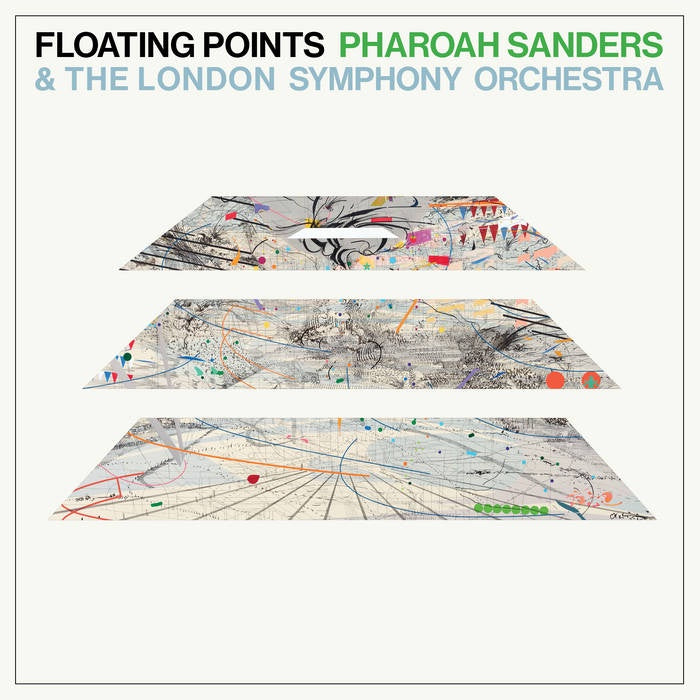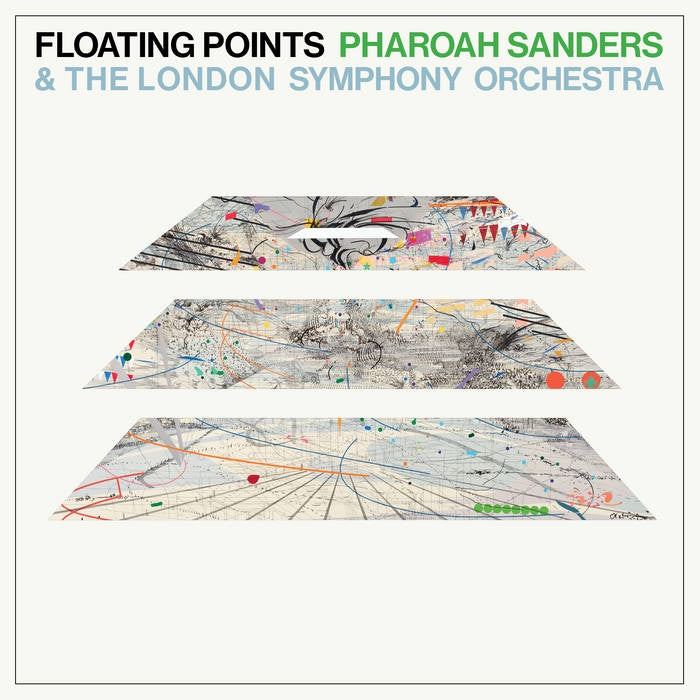Floating Points, Pharoah Sanders & The London Symphony Orchestra Promises
-
Regular price
-
$48.00 SGD
-
Regular price
-
-
Sale price
-
$48.00 SGD
- Unit price
-
per
Couldn't load pickup availability
About
— The Analog Vault // Essential Listening —
Consisting of a single 46-minute composition, divided into nine movements, the unlikely team- up between British electronic music producer Floating Points and American jazz saxophonist Pharoah Sanders resulted in the production of an extraordinary album that bridges generational, genre and musical barriers. Recorded with august assistance from the London Symphony Orchestra, Promises is a sweeping, otherworldly and ethereal experience that feels like a cosmic communion.
Anchored by Floating Points’ synthetic arrangements and a compact seven-note harpsichord arpeggio motif, Promises is poignantly populated by the spirituality of Sanders’ tenor sax and the cinematic swells of violins, violas, cellos, and double basses. What follows is a truly joyous creative conversation that modulates and mutates from contemplative and mournful into something exultant and metaphysical. — The Analog Vault
—
The all-star collaboration between a producer, a saxophonist, and a symphony is a celestial event. But it’s Pharoah Sanders’ playing that holds it all together, a clear late-career masterpiece.
Throughout its emotional 46 minutes, Promises stirs feelings that can be hard to name. The first sound we hear is one that courses through the entire piece—a brief, seven-note refrain played by what seems to be a harpsichord, sometimes accented by a bell-like tone that could be the celeste. The cluster of sounds begins in silence, and we can hear the creak of wood and some shifting objects in the room where it was recorded, and it repeats every nine seconds for almost the duration of the piece. It’s a small twinkly loop that brings to mind the feeling of awakening, as if something that was unclear is now understood, there to be rediscovered with each cycle. And that repeating fragment holds the composition together, and every sound exists in relation to it, even if we can’t quite sense how they fit together.
When Sanders enters early on, his tone is clarion, melodic but harmonically free, hovering near that central cluster of notes without sounding bound to it. His opening solo, set against a quiet backdrop, is slow and searching, alternating between held notes that convey melancholy and short trills of melody that suggest hope. In “Movement 3,” when the strings enter, soft at first, then more shrill, Sanders shifts his playing to meet their register, and the piece gets spacier, even a little psychedelic. Something about that central loop, the strings, Sanders’ lines, and Shepherd’s subtle synthesizer drones makes me think about seeing a planet spinning on its axis from somewhere in orbit. And then as “Movement 3” bleeds into “Movement 4,” Sanders’ sets his horn aside and begins to vocalize wordlessly, offering small flutters of syllables closely into the microphone.
The effect of his naked voice is disarmingly intimate and moving. Amid this carefully composed and engineered piece, and following virtuosic soloing from one of the living masters of his instrument, we hear the simple sound of a human utterance—the most basic unit of interaction into the realm of a dream. Through “Movement 5” Sanders plays with more intensity, a cello solo follows in “Movement 6,” as the symphonic elements gather force. In “Movement 8” Shepherd folds in bits of trilling Alice Coltrane-like organ runs, and then in “Movement 9,” following a violin solo, the orchestra briefly rattles and shakes in a sharp but brief climax, and then Promises is gone, returning to silence.
The arc of Promises needs time and space to unfold, and the length and continuous nature of the piece is central to its impact. If it were 20 minutes long—or 60—it wouldn’t have the same force. Nothing is rushed, but nothing is lingered over for too long, either. And as gorgeous as Shepherd’s music and arrangements are, I keep circling back to Sanders, his horn now quieter but just as emotionally powerful as when he wielded it alongside John Coltrane at age 25, when he was ripping terrifying blasts of sound that could peel paint. He’s always been quiet as far as the press goes, doing few interviews and letting his playing do the talking. On this piece, a clear late-career masterpiece, it’s saying plenty. — (via Pitchfork)
↓
Label: Luaka Bop
Format: Vinyl, LP, Album
Released: 2021
Genre: Electronic, Jazz
Style: Soul-Jazz, Modal
File under: Electronic // Ambient / Modern Classical
File under: TAV Essential Listening
⦿
Share
- Regular price
- $48.00 SGD
- Regular price
-
- Sale price
- $48.00 SGD
- Unit price
- per
Couldn't load pickup availability
About
— The Analog Vault // Essential Listening —
Consisting of a single 46-minute composition, divided into nine movements, the unlikely team- up between British electronic music producer Floating Points and American jazz saxophonist Pharoah Sanders resulted in the production of an extraordinary album that bridges generational, genre and musical barriers. Recorded with august assistance from the London Symphony Orchestra, Promises is a sweeping, otherworldly and ethereal experience that feels like a cosmic communion.
Anchored by Floating Points’ synthetic arrangements and a compact seven-note harpsichord arpeggio motif, Promises is poignantly populated by the spirituality of Sanders’ tenor sax and the cinematic swells of violins, violas, cellos, and double basses. What follows is a truly joyous creative conversation that modulates and mutates from contemplative and mournful into something exultant and metaphysical. — The Analog Vault
—
The all-star collaboration between a producer, a saxophonist, and a symphony is a celestial event. But it’s Pharoah Sanders’ playing that holds it all together, a clear late-career masterpiece.
Throughout its emotional 46 minutes, Promises stirs feelings that can be hard to name. The first sound we hear is one that courses through the entire piece—a brief, seven-note refrain played by what seems to be a harpsichord, sometimes accented by a bell-like tone that could be the celeste. The cluster of sounds begins in silence, and we can hear the creak of wood and some shifting objects in the room where it was recorded, and it repeats every nine seconds for almost the duration of the piece. It’s a small twinkly loop that brings to mind the feeling of awakening, as if something that was unclear is now understood, there to be rediscovered with each cycle. And that repeating fragment holds the composition together, and every sound exists in relation to it, even if we can’t quite sense how they fit together.
When Sanders enters early on, his tone is clarion, melodic but harmonically free, hovering near that central cluster of notes without sounding bound to it. His opening solo, set against a quiet backdrop, is slow and searching, alternating between held notes that convey melancholy and short trills of melody that suggest hope. In “Movement 3,” when the strings enter, soft at first, then more shrill, Sanders shifts his playing to meet their register, and the piece gets spacier, even a little psychedelic. Something about that central loop, the strings, Sanders’ lines, and Shepherd’s subtle synthesizer drones makes me think about seeing a planet spinning on its axis from somewhere in orbit. And then as “Movement 3” bleeds into “Movement 4,” Sanders’ sets his horn aside and begins to vocalize wordlessly, offering small flutters of syllables closely into the microphone.
The effect of his naked voice is disarmingly intimate and moving. Amid this carefully composed and engineered piece, and following virtuosic soloing from one of the living masters of his instrument, we hear the simple sound of a human utterance—the most basic unit of interaction into the realm of a dream. Through “Movement 5” Sanders plays with more intensity, a cello solo follows in “Movement 6,” as the symphonic elements gather force. In “Movement 8” Shepherd folds in bits of trilling Alice Coltrane-like organ runs, and then in “Movement 9,” following a violin solo, the orchestra briefly rattles and shakes in a sharp but brief climax, and then Promises is gone, returning to silence.
The arc of Promises needs time and space to unfold, and the length and continuous nature of the piece is central to its impact. If it were 20 minutes long—or 60—it wouldn’t have the same force. Nothing is rushed, but nothing is lingered over for too long, either. And as gorgeous as Shepherd’s music and arrangements are, I keep circling back to Sanders, his horn now quieter but just as emotionally powerful as when he wielded it alongside John Coltrane at age 25, when he was ripping terrifying blasts of sound that could peel paint. He’s always been quiet as far as the press goes, doing few interviews and letting his playing do the talking. On this piece, a clear late-career masterpiece, it’s saying plenty. — (via Pitchfork)
↓
Label: Luaka Bop
Format: Vinyl, LP, Album
Released: 2021
Genre: Electronic, Jazz
Style: Soul-Jazz, Modal
File under: Electronic // Ambient / Modern Classical
File under: TAV Essential Listening
⦿
Share

- Choosing a selection results in a full page refresh.




